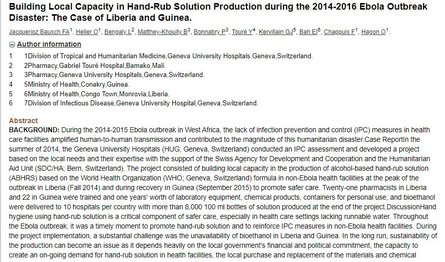
BACKGROUND:
During the 2014-2015 Ebola outbreak in West Africa, the lack of infection prevention and control (IPC) measures in health care facilities amplified human-to-human transmission and contributed to the magnitude of this humanitarian disaster.Case ReportIn the summer of 2014, the Geneva University Hospitals (HUG; Geneva, Switzerland) conducted an IPC assessment and developed a project based on the local needs and their expertise with the support of the Swiss Agency for Development and Cooperation and the Humanitarian Aid Unit (SDC/HA; Bern, Switzerland). The project consisted of building local capacity in the production of alcohol-based hand-rub solution (ABHRS) based on the World Health Organization (WHO; Geneva, Switzerland) formula in non-Ebola health facilities at the peak of the outbreak in Liberia (Fall 2014) and during recovery in Guinea (September 2015) to promote safer care. Twenty-one pharmacists in Liberia and 22 in Guinea were trained and one years' worth of laboratory equipment, chemical products, containers for personal use, and bioethanol were delivered to 10 hospitals per country with more than 8,000 100 ml bottles of solution produced at the end of the project.DiscussionHand hygiene using hand-rub solution is a critical component of safer care, especially in health care settings lacking runnable water. Throughout the Ebola outbreak, it was a timely moment to promote hand-rub solution and to reinforce IPC measures in non-Ebola health facilities. During the project implementation, a substantial challenge was the unavailability of bioethanol in Liberia and Guinea. In the long run, sustainability of the production can become an issue as it depends heavily on the local government's financial and political commitment, the capacity to create an on-going demand for hand-rub solution in health facilities, the local purchase and replacement of the materials and chemical products, as well as the availability of continuous local partners' support.